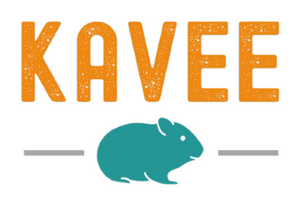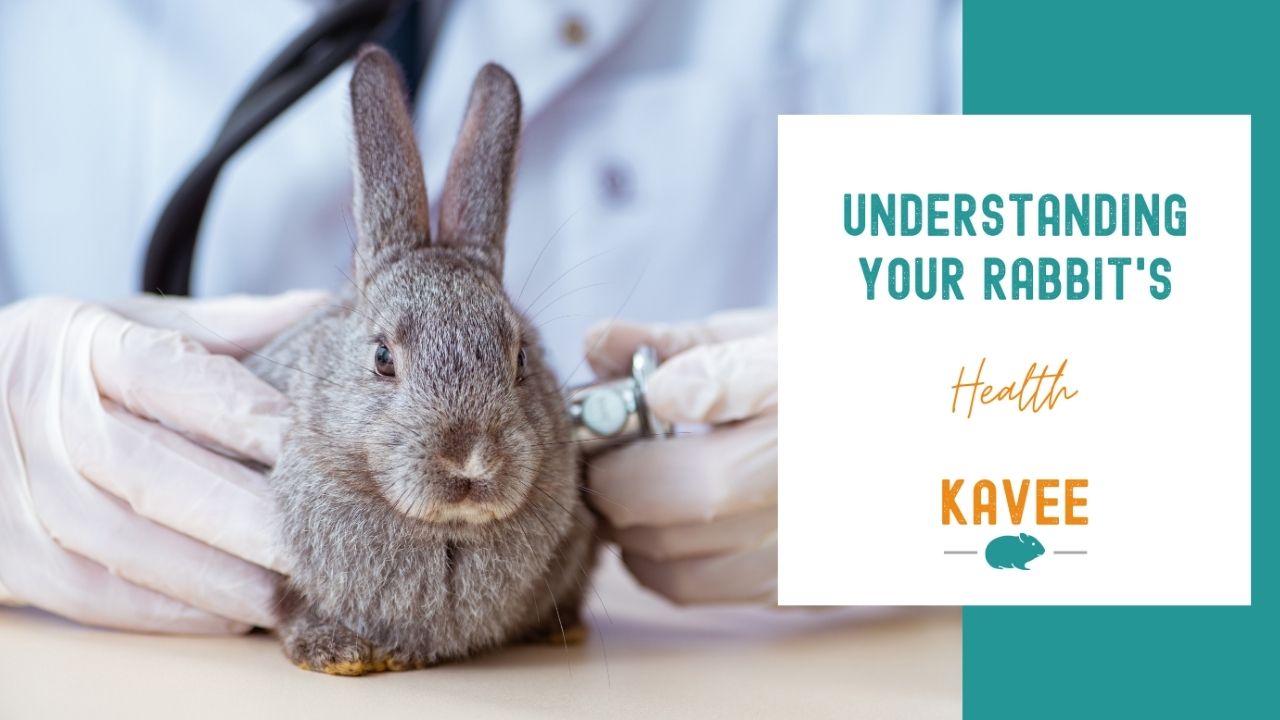By now, we’re sure that you and your bunny have become inseparable. And if you’ve followed proper rabbit care, you’ll have learned what to do to keep your bunny happy and healthy.
However, some things remain out of our control. Unfortunately, your bunny won’t be able to tell you when they’re not feeling well. So it’s the job of every responsible bunny parent to do regular health checks and investigate any signs of illness.
In this blog, we’ll walk you through all the check-ups you can carry out at home, which signs could point to common health issues, and help you figure out when it’s time to seek veterinary care for your rabbits.

Regular Health Checks at Home
You can prevent health problems from worsening by regularly checking your bunny for signs of infection or illness. Here are the areas that you should monitor on a daily, weekly, and monthly basis.
Daily Rabbit Health Checks
Back End and Bottom
While your bunnies will usually do a good job of looking after their bottoms, a daily check can ensure they’re never left with a dirty behind. Watch out for any stains of urine or poops that got stuck in the fur.
Those can usually be spot cleaned with a groom. But if your bunny’s bottom has got particularly dirty, your vet may recommend a bath (the only time this is allowed!).
When the weather gets warmer, the RSPCA recommends twice daily checks to prevent fatal conditions such as flystrike.
Toilet Habits
As you clean up your bunny’s litter box to ensure a good standard of hygiene, make sure to always check for anything unusual. This could be blood in the urine, deformed poops, or your bunny straining to pass urine or poop.
If you spot any of those signs, make sure to bring your floof to the vet for a thorough check.
Fur and skin
A fur and skin check can be done daily or weekly depending on how frequently you groom your rabbit. Before you brush your bunny, have a look for any wounds, scratches, or signs of mites. The latter can cause bald patches on their skin or dandruff!
If you spot any of those signs, bring them to the vet so that they can receive the appropriate treatment to keep their coats healthy.

Weekly Rabbit Health Checks
Teeth
Your bunny’s teeth are always growing and so they’re quite prone to health issues. The best way to keep their teeth in check is with a high fiber diet but sometimes, even with the right diet, they could develop dental issues.
That’s why it’s important that you regularly check for any overgrown teeth, dribbling, or lumps. If you notice your bunny eating less frequently or forgetting to groom, these could also point to a dental problem and will require veterinary care.
Nose
While it’s pretty common for hoomans to get a cold, a bunny that sneezes and has a runny nose should be taken seriously. When you check their noses, watch out for any mucus around their nasal area, and even their front legs.
This is because bunnies with runny noses are likely to wipe off any discharge. So a clean nose might not always tell the whole story!
Loud breathing can be another sign of an infection that needs investigating by your local bunny-savvy vet.

Eyes
It’s common for rabbits to experience blockages in their tear ducts or conjunctivitis. When you inspect your bunny’s eyes, check to see whether there is any discharge or if they look sore. Again, check the fur on their front legs in case they’ve been wiping off any discharge.
Some of those signs could also be related to dental problems. Either way, a trip to the vet is always the best way to solve this mystery!
Ears
Your bunny’s ears are unfortunately prone to infections and other ear-related issues. While it’d be impossible for you to look inside their ear canal, you can check the outer part of their ears for a wax build-up, discharge, ear mites, or lumps.
Just make sure to never poke anything inside your bunny’s ear - it’s always best to leave any further investigating to your vet. Frequent scratching can also indicate an infection, and any head tilting requires urgent vet attention.

Monthly Rabbit Health Checks
Feet
Rabbits are dedicated athletes so it’s no surprise that with time, they could develop sores on their feet. It’s always best to give them a thorough check once a month as problems on their feet can significantly impact their health and wellbeing.
One of the most common health issues in the feet is sore hocks (more on this later).
Claws
It’s important to trim a rabbit’s claws once a month. While you do that, you can watch out for any nails that are growing inwards or have suddenly split. Any awkward movements could also point to overgrown nails!
You can learn how to cut your rabbit’s nails yourself or let a vet take care of it.

Common Rabbit Health Issues
There are certain health issues that rabbits are commonly more prone to. Let’s look at which symptoms you should watch out for and what they indicate.
Dental Issues
As we’ve mentioned before, a rabbit’s teeth are constantly growing. Since your pet rabbit is unlikely to chew on as much coarse hay as their wild counterpart, they’re more prone to overgrowing their teeth.
Overgrown teeth can lead to dental abscesses, and cause your poor floofs quite a lot of discomfort! Keep an eye on the following signs as they could point to dental issues:
- Lack of eating and/or grooming
- Swelling around the face
- Drooling
- Runny eyes
Regular health checks and plenty of hay and grass can all help prevent these issues from happening or worsening.
Flystrike
Flystrike is a serious rabbit health issue, most common when the weather gets warmer. This happens when a rabbit’s bottom stays dirty and damp, attracting bluebottle and greenbottle flies. These nasty insects will lay eggs on rabbits and their maggots will end up feeding on their skin.
Of course, nobunny wants this to happen! The best way to prevent flystrike in rabbits is by grooming them regularly and frequently cleaning their environment (even more in the warmer months!). You should also watch out for these signs:
- Lethargic behavior
- Refusal to move
- Tendency to dig into a corner
- Reduced appetite
If you have a poorly or elderly bun who struggles to stay clean, then talk to your vet as it might be one of those rare occasions where they need bathing.

Respiratory Infection
Also known as ‘snuffles’, cold symptoms in a rabbit can indicate a serious bacterial infection. These are the signs you should watch out for and that require veterinary care for your rabbits:
- Mucus and discharge on the nose (and on their paws too as they try to clean their noses!)
- Reduced appetite
- Runny eyes
- Difficulty breathing normally
Once again, keeping your bunny’s living area clean is the best way to prevent infections. It’s also recommended to avoid using cedar or pine shavings for their cage’s bedding as these are toxic and can cause respiratory problems!
Head Tilt
A rabbit's head tilt is a serious health issue and requires immediate veterinary attention. The cause of this problem is usually related to something inside your bunny's ear canal or brain, like an infection, trauma, or in more serious cases a tumor.
Some other symptoms that may come with a head tilt are:
- Flickering eyes
- Loss of balance and falling over
- Difficulty standing
- Head shaking
Since a head tilt in rabbits is often caused by infections, it goes without saying that proper rabbit care and regular rabbit health checks are the best ways to monitor and potentially prevent this serious issue.
Gastrointestinal (GI) Stasis
A GI Stasis is one of the most serious conditions a rabbit can face, as it indicates their gut slowing down or stopping altogether. This usually can point to a change in the bacteria that lives in their GI tract, and that’s in charge of fermenting your bunny’s food.
These are the common signs of GI stasis in rabbits you should watch out for:
- Reduced or total lack of appetite
- Lethargy
- Smaller fecal pellets
- Lack of fecal pellets
The best way to prevent GI Stasis in rabbits is by keeping them active and providing them with a diet rich in fiber.

Preventive Care and Regular Vet Checks
For every rabbit health issue we discussed above, there is no better prevention than sticking to regular vet visits. Whether it’s bringing your bunnies for their check-ups or promptly visiting the vet when you spot any unusual signs - all of these ensure great rabbit care.
When to visit the vet
Ideally, you should be bringing your bunny for a vet visit once a year for a general check-up and vaccine boosters.
You should also make a trip to the vet if you spot anything unusual that could indicate an health issue for your poor bun. This is what you can expect when a vet checks your bunny:
- Your vet will thoroughly examine your rabbit to determine their health.
- They will also inspect their coat to check for any parasites.
- They may then recommend any specific treatments if needed.
Of course, your bunny is unlikely to be thrilled at the prospect of a stranger handling them (and who can blame them?!). You can try to sweeten the experience by bringing their favorite treats with you or keeping them cozy with a comfortable carrier.
Changes in Habits
Sometimes, your bunny might not display any signs of illness but suddenly change their routine. A healthy bunny will be munching on hay pretty much all day long, and make an impressive amount of droppings - between 200 to 300 a day!
So if they suddenly stop eating or pooping as much, it’s best to bring your bunny to the vet to investigate things further.

Conclusion
Nobunny wants to think about their fluffy companions being ill, but it’s always better to be prepared for the eventuality and learn how anything can impact their health, even their cage. This way, you will know how to react and support your bunny through the ups and downs of life.
Sometimes, a quick health check could be what saves them from discomfort or the worsening of a serious health condition. So keep up with them, both at home and at the vet, and your bunny will thank you with an a-bun-dance of cuddles!





